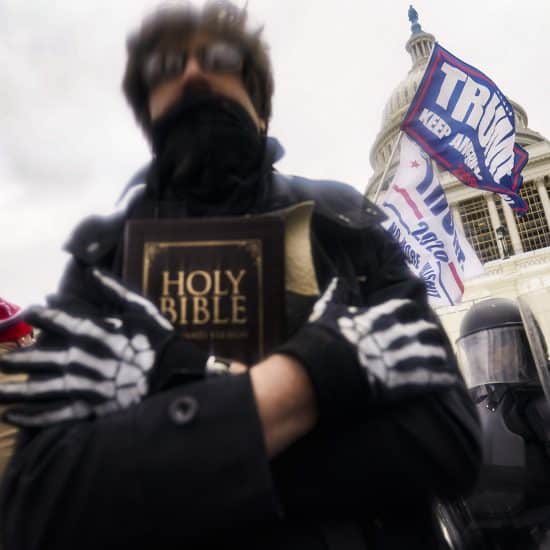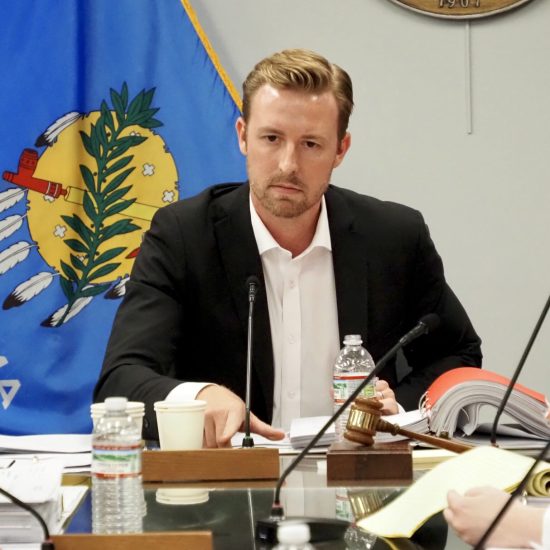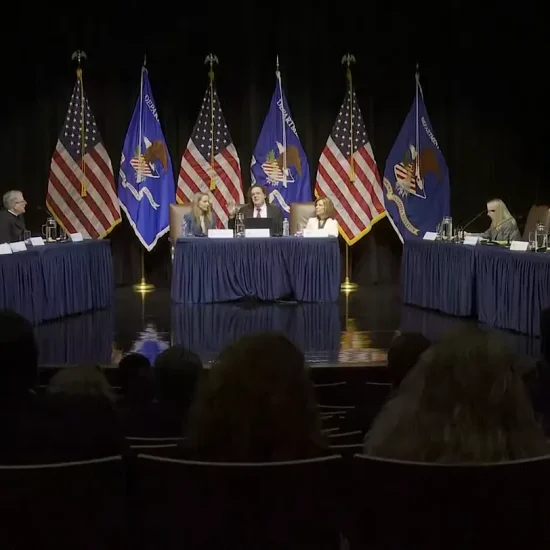
Our Father, who art in heaven…
On Monday (Jan. 31), protesters filled the Missouri Capitol to denounce Gov. Mike Parson’s pick to lead the state’s Department of Health and Senior Services. Some Republican lawmakers even spoke at the rally opposing the nomination by a governor of their own party. And while both Parson and his nominee, Donald Kauerauf, oppose COVID-19 vaccination mandates, they’ve encouraged vaccinations. And that sparked the anti-vax rally.
…hallowed be thy name…
Over 100 unmasked conservative activists shouted in the Capitol to oppose Kauerauf’s nomination. Some carried signs like “No More Mandates” and “Vaccines are Toxic.” Many held up signs denouncing the conservative governor for making the pick: “Parsons [sic] Has Gone Commie,” “If Kauerauf Stays Then Parson Goes,” and “Swamp Creature Parsons [sic].” Some lawmakers expressed anger that Kauerauf supported mask-wearing and opposed the use of ivermectin, a parasitic drug that conspiratorial anti-vaxxers push as a COVID treatment.
…thy kingdom come, thy will be done on earth as it is in heaven…
Other signs in the Capitol on Monday invoked God in this political fight against COVID vaccinations. People carried signs declaring “God! Help Us!” and “God-Given Natural Immunity” (with the latter also including the words from Genesis 1:27 and Psalm 139:14). Helping promote, organize, and emcee the rally was Bev Ehlen, director of the Missouri chapter of Concerned Women for America (a conservative Christian political activist organization). She even pushed the false claim that Kauerauf wanted “a forced vaccination policy.”
The rally in the Capitol rotunda opened with an explicitly Christian prayer asking God to “be with us, that you would anoint us, and that you would anoint your servants, our public servants, our elected officials. Father, I pray that you would turn their hearts back toward you, that truth would be revealed today … We give this government back to you. In the name of Jesus, amen.”
…give us this day our daily bread, and forgive us our debts and we forgive our debtors…
As lawmakers and protesters raised their voices, Parson attempted to save his nominee who had actually been leading the state’s health department since September (and thus during the delta and omicron surges). So, with protesters in the building, the governor issued a last-minute statement to denounce misinformation and highlight Kauerauf’s professional qualifications. And Parson noted Kauerauf also has “a disciplined moral compass that is guided by our Missouri principles: Christian values, family values, and love for this nation.”
…and lead us not into temptation, but deliver us from evil…
Shortly thereafter, Kauerauf took his seat in a Senate hearing room to answer questions about his nomination. As Sen. Dave Schatz, the Republican who leads the chamber as president pro tem, started the hearing, senators and others in the room could hear the protesters outside in the hallway. In unison, a chant echoed through the building as the protesters hoped to send one last message to the senators. That message came as they yelled out the words of the “Lord’s Prayer.”
…for thine is the kingdom and the power and the glory forever. Amen.
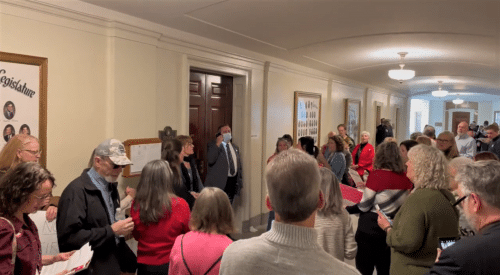
Screengrab of protesters reciting the Lord’s Prayer while standing outside a Senate hearing room in the Missouri Capitol on Jan. 31, 2022.
Ultimately, the protest worked. A filibuster by some conservative senators and a snowstorm that canceled two days of session this week means the legal clock for the Senate to confirm Kauerauf’s nomination would run out. So, he officially resigned Tuesday after the Senate killed his nomination by refusing to even vote.
In a statement naming an interim director, the governor also blasted “the events that have transpired” around Kauerauf’s hearing as “nothing short of disgraceful, unquestionably wrong, and an embarrassment to this state and the people we serve.” Parson referenced his own pro-life values to insist lawmakers should’ve known he “would not have nominated someone who does not share the same Christian values.” But Ehlen of Concerned Women for America saw it differently: “Praise and thanks first go to our Heavenly Father who moved and used individuals in many different ways to defeat the confirmation of Mr. Kauerauf. Thank you for praying and for taking the action you did.”
While media coverage of the events this week focused on the politics of those who sank Kauerauf’s nomination, the chanting of the Lord’s Prayer went virtually ignored in reports despite its prominent billing during the protest. So, in this issue of A Public Witness, we recite the ways the Lord’s Prayer has been co-opted at political rallies across the country. Then we meditate on what is happening and the inherent politics of the Lord’s Prayer.
Let Us Pray
It might be tempting to dismiss the use of the Lord’s Prayer during Monday’s anti-vax protest as an odd anomaly. But those sacred words actually keep popping up in political protests despite the fact that Jesus introduced the prayer by warning his followers not to pray like the hypocrites standing “on the street corners to be seen by others.”
The day before the protest in Missouri, anti-vax protesters north of the U.S. border similarly chanted the Lord’s Prayer. The so-called “Freedom Convoy” saw truckers and other Canadians descend on their national capital of Ottawa over the weekend to protest a vaccine mandate. As the thousands of protesters gathered — some waving Nazi and Confederate flags alongside Canadian ones — activist Ginny Bruneau spoke to the crowd on Sunday. She talked about the importance of saying the Lord’s Prayer to urge “the living God to change this country in Jesus’s precious and holy name.” Many in the crowd shouted out the words as she led them.
Nor did this start with the anti-vax movement. The Lord’s Prayer made multiple appearances in Washington, D.C., on Jan. 6, 2021. As we previously reported, Donald Trump’s spiritual advisor Paula White offered a prayer to start Trump’s rally that day in protest of the election results.
With the White House behind her, she proclaimed that “God is going to be in today.” And she asked God to “turn the hearts of those who are in power and in position to make decisions to walk in your wisdom and to do justly today for the integrity of democracy” (though in hoping to overturn the results of a free and fair election, she fails to grasp what the “integrity of democracy” requires). Then she asked the crowd of future insurrectionists to join her in saying the Lord’s Prayer. But she added to the ending.
“…For thine is the kingdom and the power,” White prayed, “and the glory forever, and we all said for this United States of America, amen, for as our president says, ‘we worship God, not government.’”
A few hours later, a woman stood with a bullhorn next to the Capitol as insurrectionists mingled around and others entered the building. She led those standing there with their MAGA hats and Trump flags in saying the Lord’s Prayer. At the close she added, “Thank you, guys, for being such good patriots. You guys really inspire me.”
Interestingly, while White used the “forgive us our debts” version, the bullhorn lady went with “forgive us our trespasses.” While God is merciful, federal prosecutors are less forgiving about the trespasses of that day.
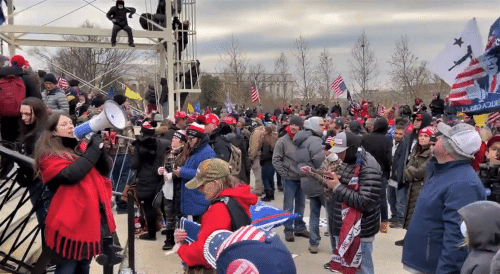
Screengrab of a woman with a bullhorn reciting the Lord’s Prayer outside the U.S. Capitol on Jan. 6, 2021.
Hearing the Lord’s Prayer on Jan. 6 probably shouldn’t surprise us given the pervasive Christian Nationalism on display during the insurrection. We watched as people stormed the Capitol to undermine democracy while carrying Bibles, Jesus signs, and Christian flags. Like those other co-opted symbols, the Lord’s Prayer was already being used during earlier protests against the 2020 election. For instance, a crowd that gathered outside the U.S. Supreme Court on Dec. 12, 2020, said the Lord’s Prayer as they waved signs claiming there had been election fraud.
And the Lord’s Prayer has made appearances at other protests for various causes in recent years. Like during a 2019 protest against the treatment of migrant children as Catholic nuns and activists were arrested in a U.S. Senate building; a September 2020, Black Lives Matter march in Rochester, New York; and a December 2020 rally against COVID restrictions outside the Montana governor’s office.
Then there was the July 2021 school board meeting in Rochester, Minnesota, where a group showed up to complain about “critical race theory,” masks, Black Lives Matter, and the “deep state” control of the board. To add to their arguments, those interrupting the meeting recited the Lord’s Prayer. The latter move sparked a couple dozen local clergy to release a joint statement.
“We are especially dismayed that the Lord’s Prayer became a weapon, rather than the teaching of Jesus in the gospel according to Matthew,” the clergy wrote. “People shouting a Christian prayer in a school board meeting of a district that serves students of many religions, as well as no religion, goes against all these teachings.”
Help sustain the ministry of Word&Way by subscribing to A Public Witness!
Christian Identity
The use of the Lord’s Prayer at these and other protests should raise important concerns for Christians. While incorporating the prayer into our individual devotional lives and communal worship should be encouraged, followers of Jesus should be wary of our sacred words and symbols being exploited for partisan political purposes.
There are, of course, many things protesters can shout. So, why the Lord’s Prayer? What is going on when these words from scripture are used to galvanize political mobs? These questions are similar to asking why insurrectionists carried the Christian flag when they stormed the Capitol on Jan. 6, 2021. That symbol meant something to them. While we perceive them as heretically professing Christian Nationalism, they presumably saw themselves as righteous warriors. These words and symbols are identity markers that make a statement about the group.
While anyone can pick up and carry a flag, the Lord’s Prayer reflects a more intense expression. You have to know the words to join the chant. By reciting the words together, the group literally says something about who they are. They acknowledge themselves as members of a community — which is one reason Christians say it together during worship. It’s a way of marking ourselves as one body with shared values and beliefs.
But that identity marker takes on new meaning in the middle of a public protest. Shouting the words confrontationally against public leaders in a state senate hearing implies that those saying it belong to one community while the targets of their ire are rhetorically excommunicated. It suggests that the health director’s values and beliefs contradict the words they’re reciting. That is, it insinuates he isn’t Christian and thus should be opposed. Perhaps that’s why Missouri’s governor emphasized the Christian beliefs of himself, his nominee, and even the whole state in statements both during the protest and after the nomination failed. Both sides consider this as a fight about who is or isn’t Christian. Both sides see this as a Christian state, which makes the Lord’s Prayer a civic script.
And that’s where this gets dangerous. What if we turn the Lord’s Prayer from being a communal statement that unites us into a political attack that divides us? What if instead of drawing us towards God, we use it in idolatrous ways?
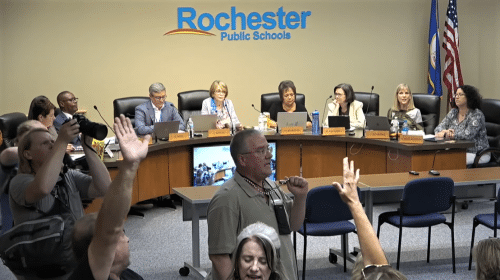
Screengrab of part of the group interrupting a Rochester, Minnesota, school board meeting by reciting the Lord’s Prayer on July 13, 2021.
We asked Duke theologian Will Willimon about this since he co-authored Lord, Teach Us: The Lord’s Prayer & the Christian Life with Stanley Hauerwas. They see the prayer as essential to understanding the Christian faith. As they explained in the book: “So, if you are asked, ‘Who is a Christian?’ the best answer you can give is, ‘A Christian is none other than someone who has learned to pray the Lord’s Prayer.’” But they warn in the book that “even this prayer can be prayed falsely.” And Willimon thinks the Missouri protest is an example of that.
“‘Thy kingdom come, thy will be done’ clearly makes the Lord’s Prayer ‘political,’ but in a way that fundamentally challenges what passes for politics among American Christians,” he told us. “Missouri is not the kingdom of God by a longshot. I think it dangerous to make too easy a move from talk of God’s Kingdom to the assumption that America (or Missouri) is roughly equivalent with God’s reign and intentions.”
“As a Christian, I’m offended that a group of fellow Christians actually enlisted the Lord’s Prayer as a means to defend their right not to vax, not to protect their children and grandparents and everyone else,” Willimon added. “They should be praying, ‘Lead us not into temptation to think that Fox News is revelation or that our own individual choices and self-centeredness aligns with God’s will.’”
When the Lord’s Prayer is employed in service of an earthly kingdom, it leads away from what Jesus intended. After all, it is already a political prayer.
Get cutting-edge analysis and commentary like this in your inbox every week by subscribing today!
Whose Will Be Done?
To pray the Lord’s Prayer isn’t merely a spiritual declaration. If we listen to the words as we say them, we should recognize their political weight. But that realization doesn’t align with the agendas dominating our politics. And getting us to see that is kind of the point of the prayer.
Southern Baptist Theological Seminary President Al Mohler, who wrote The Prayer That Turns the World Upside Down: The Lord’s Prayer as a Manifesto for Revolution, told Baptist Press that praying those words is a revolutionary act: “With those words every empire falls, every throne other than the throne of Christ is shattered. With those words, the world is turned upside down. That relativizes every earthly allegiance. It puts into context every political power and promises the doom of every political power.” (We think Mohler’s pretty smart on that point, though he might not return the compliment.)
Similarly, Robert Cornwall, a minister in the Christian Church (Disciples of Christ) wrote about this in his book Ultimate Allegiance: The Subversive Nature of the Lord’s Prayer. He told us Christians need to pay attention to the politics that Jesus taught with the prayer or else “the Lord’s Prayer is a meaningless repetition.”
“God deserves our ultimate allegiance, our loyalties extend beyond national boundaries, and I would add all other boundaries,” he explained. “That means Christian Nationalism runs counter to this prayer many of us recite weekly. This allegiance includes following the law of love of God and neighbor. Therefore, any act or claim that runs counter to this is inappropriate.”
Thus, for Christians, the Lord’s Prayer offers perspective. It witnesses to the conviction that human governments are flawed in contrast with the promised eternal reign of God announced by Jesus. God’s kingdom is one of justice and relief from oppression. Our world is marred by inequities. Where we cling to wealth, status, and material goods for sustenance, the Lord’s Prayer refocuses our attention to our ultimate dependence upon God for our “daily bread.” Jesus exhorts his followers to pray in a way that shifts their attention away from themselves — and the broken structures they create — to the fullness of God’s intentions.

(Pedro Lima/Unsplash)
Obery Hendricks, a visiting research scholar at Columbia University and author of books like The Politics of Jesus and Christians Against Christianity, told us the problem is “the prayer has been domesticated in a way that most folks don’t even think about when they pray.” Thus, he wants Christians to recognize “the radicality underlying the Lord’s Prayer” with “an anti-empire dimension in that it asked for God’s kingdom to come to replace Caesar’s kingdom.”
Referencing the use of the prayer at the Missouri protest, he noted in that case “it’s almost like it’s a political anthem. It’s an expression of Christian Nationalism.” He added, “It’s really sick. It’s really perverse. And it shows a lack of understanding of the Bible. But it also represents a weaponizing of the gospel in a very inappropriate way.”
“The Lord’s Prayer is one that is concerned with the welfare of the people, that they be treated justly and equitably in society,” Hendricks explained. “If we’re talking about vaccines, for instance, we’re talking about trying to get people to fulfill their responsibility to their neighbors. Jesus says, ‘Love your neighbor as yourself.’”
For the moment, that lesson appears lost on those in Missouri who so loudly took the Lord’s name in vain. But the danger extends far beyond a protest in one state or the sacrilege on Jan. 6. The Christian flag being co-opted by Christian Nationalists and White Supremacists is a sad indictment of present reality. Losing Christian language and identity to political polarization is a far worse crime.
Our fear is that this episode in our home state is a sign of things to come, as something central to the spiritual lives of Christians across traditions and throughout the centuries becomes one more tool of partisan warfare. We expect to see the Lord’s Prayer increasingly used by those on the political fringe to mainstream their positions and build their power.
These pagans are babbling on, thinking they will be heard because of their words. Let’s pray that God leads others away from such temptations.
As a public witness,
Brian Kaylor & Beau Underwood

